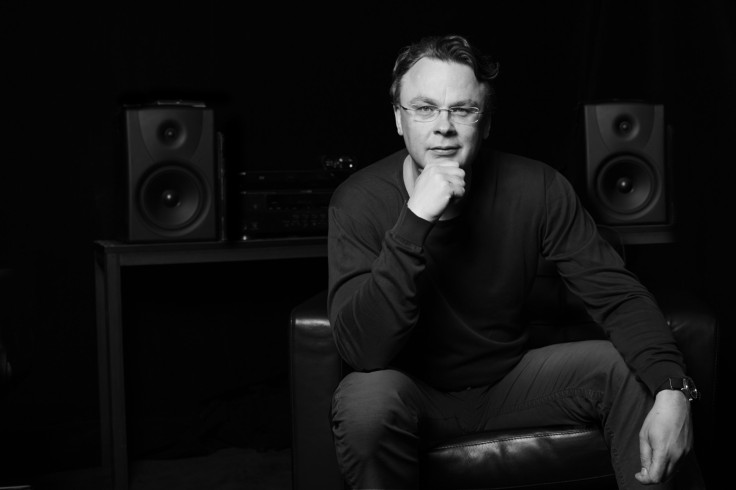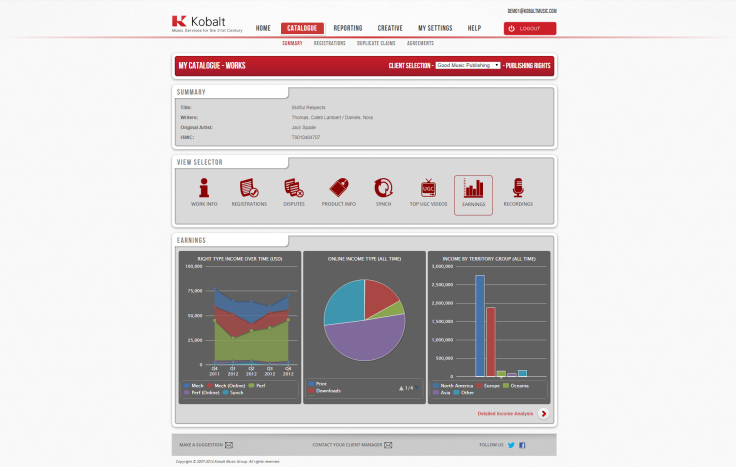Kobalt: The Other Swedish Startup Trying To Disrupt The Music Business

What is it about Sweden and music? Spotify and Soundcloud sprang from the minds of music-loving engineers looking to make it through months of darkness, but there’s a lesser-known music company that could turn out to be just as influential: Kobalt.
In 2001, yet another Swedish engineer, Willard Ahdritz, set out to tackle a challenge as massive and technical as any in business: build digital pipes to replace the faxes, emails and Excel spreadsheets that currently power the back end of the music industry. It's taken him nearly 15 years -- that’s six more than it took for NASA to land a man on moon -- and $60 million in venture funding, but now Kobalt is throwing itself a bit of a coming-out party.
Billboard named the insurgent company, which manages rights for artists such as Dave Grohl, No Doubt and Paul McCartney, the No. 2 music publisher based on U.S. radio plays last quarter. Ahdritz believes the company controls 40 to 50 percent of the top 100 English-language songs. "The future of the music industry needs a completely different structure to work," he said during an interview in Kobalt's New York City office. "The pipes are all broken; you cannot spend five dollars to collect one dollar."
Unlike Spotify and Soundcloud, well-known brands among music lovers, Kobalt is the most influential music startup you've never heard of. Indeed music fans have no reason to know what it is, even as the company grabs market share in the crippled state of the music business.
The music world is quickly moving from sales of any kind to services, where artists earn tiny fractions of a cent when a song is played. Data from Warner Music released last week captures that shift: Revenue from paid streaming services increased 74 percent last year while digital sales fell 12 percent. Yet getting an artist paid was, and still is, a Rube Goldberg machine of collections agencies, territorial publishers, local publishers and lawyers built for a world of album sales and terrestrial radio plays. The time it takes from the use of a piece of music to payment is 2.5 years, if it ever comes at all.
Kobalt has spent all this time and money -- investors include Michael Dell -- building a technological back end (i.e., a massive Oracle database) to record and pay the billions of microtransactions that could occur from a single song. Kobalt's clients are artists themselves and, to some extent, other publishers who use its technology.
Over the past decade the music business has gone from a $13 billion industry in the U.S. dominated by physical discs to a $7 billion industry dominated by streaming, according to the Recording Industry Association of America. It’s a nasty trend line for anyone who cares about the business, but Ahdritz sees the album-driven era of "big music" as the anomaly.
“We both know it was a golden period when you could charge $20 for a CD, and you had one or two songs that were good,” he said. “Consumers aren’t going to buy seven bad tracks for $20 because there are singles.”
Back when Ahdritz launched Kobalt in 2001 the music industry was in a pitched legal battle with Napster, peer-to-peer services and suing kids for illegal downloading in their bedrooms. But behind the scenes on the operations side the music industry was the equivalent of a failed state, totally unprepared for a future when its business would be driven by billions of microtransactions generated by the likes of Vevo, Spotify, YouTube and Pandora, not to mention radio plays around the world.

Kobalt's tech gives artists a dashboard that shows in real time where the money is coming from and can handle nine-decimal fractions of a cent. "The vision is radical when you compare it to how the traditional music industry had done business," said Casey Rae, CEO of the Future of Music Coalition. "You can see how it would rattle cages. The traditional music business is all about recapturing value from the decline in physical sales."
To the music industry, Kobalt is a bit like Google: both attempting to enable this new world of music distribution as well as competing with just about everyone in it. Kobalt was built from scratch to thrive in a world of billions of micropayments. It acts as both a music publisher, collecting tiny royalty payments for song writers, and a tech provider, allowing other publishers to do the same. Legacy labels and publishers were, and to some extent remain, financial black boxes where artists don’t know where the money comes from and who’s taking a tithe along the way.
While the music industry has adapted to streaming, just as it adapted to digital sales, it is still trying to cling to old ways of doing business. Taylor Swift famously pulled her entire catalog from Spotify as she launched her hit record "1989," citing thin payments from the service. Services such as Spotify and Soundcloud have turned music piracy into a niche business, but critics say they've done a poor job of converting music listeners into subscribers.
"Right now, enabling meaningful global growth in the number of paying subscribers is the best option for artists, for songwriters, for copyright owners and for the services themselves," Warner Music CEO Stephen Cooper said to shareholders last week.
But the major labels took big upfront payments from Spotify, and the biggest ones took equity stakes. It's unclear how those payments or any future earnings from a Spotify IPO would be distributed to artists. Even very highly paid artists have little idea where the money comes from. Indeed, as Bono said at an appearance at the Dublin Web Summit last fall: "The real enemy is not between digital downloads or streaming; the real enemy, the real fight, is between opacity and transparency."
Kobalt President Richard Sanders, a longtime label executive and former Sony Music chairman of international and president of global marketing, says that transparency challenges the label model. "They cannot afford transparency because of the legacy deals they have in place. When you are starting from scratch, you can afford to do it because you have nothing to hide," said Sanders, who joined Kobalt from Sony in 2012.
As to why this is all happening in Sweden? Ahdritz has a theory: "It's dark for six months -- I think that helps. Think of it if you lived in Jamaica, only an idiot would sit there in the dark and try to solve the world's problems."
© Copyright IBTimes 2024. All rights reserved.






















